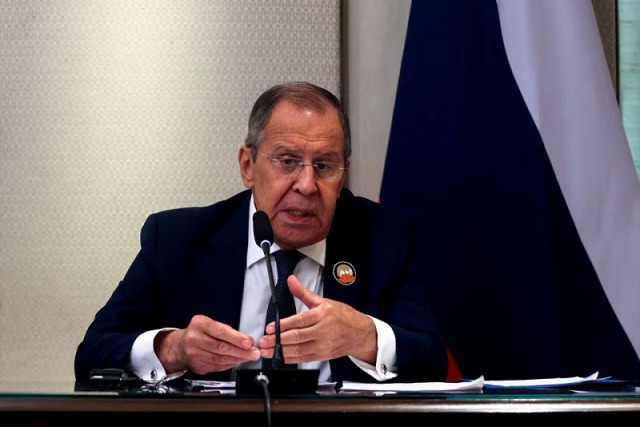MOSCOW:
Russia said on Wednesday attempts to resolve security issues relating to Ukraine without Moscow’s participation were a “road to nowhere,” sounding a warning to the West as it scrambles to work out guarantees for Kyiv’s future protection.
Foreign Minister Sergei Lavrov particularly criticised the role of European leaders who met U.S. President Donald Trump and Ukrainian President Volodymyr Zelenskiy at the White House on Monday to discuss security guarantees for Ukraine that could help end the three-and-a-half-year-old war.
“We cannot agree with the fact that now it is proposed to resolve questions of security, collective security, without the Russian Federation. This will not work,” Lavrov told a joint press conference after meeting Jordan’s foreign minister.
U.S. and European military planners have begun exploring post-conflict security guarantees for Ukraine, U.S. officials and sources told Reuters on Tuesday. Lavrov said such discussions without Russia were pointless.
“I am sure that in the West and above all in the United States they understand perfectly well that seriously discussing security issues without the Russian Federation is a utopia, it’s a road to nowhere.”
NATO military leaders holding a video conference on Wednesday had a “great, candid discussion” on the results of recent talks on Ukraine, the chair of the alliance’s military committee said.
“Priority continues to be a just, credible and durable peace,” Admiral Giuseppe Cavo Dragone wrote in a post on X.
A Western official told Reuters that a small group of military leaders continued discussions in Washington on security guarantees shortly after the bigger virtual meeting.
After Polish officials said that an object that crashed in a cornfield in eastern Poland overnight was likely a Russian drone, Poland accused Russia of provoking NATO countries just as efforts to find an end to the war were intensifying.
“Once again, we are dealing with a provocation by the Russian Federation, with a Russian drone. We are dealing in a crucial moment, when discussions about peace (in Ukraine) are under way,” Defence Minister Wladyslaw Kosiniak-Kamysz said.
Lavrov’s comments highlighted Moscow’s demand for Western governments to directly engage with it on questions of security concerning Ukraine and Europe, something it says they have so far refused to do.
Moscow this week also restated its rejection of “any scenarios involving the deployment of NATO troops in Ukraine.”
Lavrov accused the European leaders who met Trump and Zelenskiy of carrying out “a fairly aggressive escalation of the situation, rather clumsy and, in general, unethical attempts to change the position of the Trump administration and the president of the United States personally … We did not hear any constructive ideas from the Europeans there.”
Trump said on Monday the United States would help guarantee Ukraine’s security in any deal to end Russia’s war there. He subsequently said he had ruled out putting U.S. troops in Ukraine, but the U.S. might provide air support as part of a deal to end the hostilities.
Zelenskiy’s chief of staff, speaking after a meeting of national security advisers from Western countries and NATO, said work was proceeding on the military component of the guarantees.
“Our teams, above all the military, have already begun active work on the military component of security guarantees,” chief of staff Andriy Yermak wrote on social media.
Yermak said Ukraine was also working on a plan with its allies on how to proceed “in case the Russian side continues to prolong the war and disrupt agreements on bilateral and trilateral formats of leaders’ meetings.”
Lavrov said Russia was in favour of “truly reliable” guarantees for Ukraine and suggested these could be modelled on a draft accord that was discussed between the warring parties in Istanbul in 2022, in the early weeks of the war.
Under the draft discussed then, Ukraine would have received security guarantees from a group of countries including the five permanent members of the U.N. Security Council – China, Russia, the United States, Britain, and France.
At the time, Kyiv rejected that proposal on the grounds that Moscow would have held effective veto power over any military response to come to its aid.
